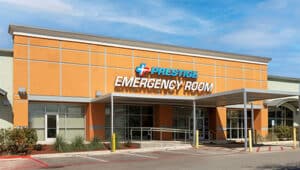Emergency Care for Pediatric Dehydration
We understand how precious your child is to you and how difficult it is to see them feeling unwell.
At Prestige ER, our dedicated teams provide expert, compassionate care for pediatric dehydration and so much more. Our mission is to give parents peace of mind and ensure children receive the gentle, attentive treatment they deserve.
What Is Pediatric Dehydration?
Pediatric dehydration occurs when a child loses more fluids than they take in, leading to an imbalance in the body’s hydration. Children are particularly vulnerable to dehydration due to their smaller fluid reserves, faster metabolic rates, and limited ability to communicate thirst.
As a result, they are more prone to complications from fluid loss, emphasizing the importance of early symptom recognition and prompt pediatric dehydration treatment.
Symptoms of Dehydration in Children
Pediatric dehydration symptoms can differ with age. Infants and young children may have one or more of the following:
- Dry lips, mouth, or tongue.
- No tears when trying.
- No wet diapers for three hours.
- Sunken eyes or cheeks.
- Sunken soft spot on the top of their head.
- Cranky, irritable, or inconsolable.
In addition to these symptoms, older children may complain about or exhibit one or more of the following:
- Dizziness or light-headedness.
- Nausea or headaches.
- Dark yellow or brown urine.
- Fewer wet diapers or less frequent bathroom breaks.
- Lethargy.
Causes and Risk Factors of Pediatric Dehydration
The most common child and baby dehydration risks include:
- Physical activity or exercise.
- Severe vomiting or diarrhea.
- Fever.
- Certain medications (e.g.., diuretics).
- Being younger than six months.
- Extreme heat.
How to Check for Dehydration in Your Child
Simple Ways to Assess Dehydration at Home
If you’re concerned that your child is dehydrated, look for signs like:
- Dark yellow or brownish urine.
- Dry lips and mouth.
- Decreased urine output.
- Sunken eyes.
- No tears when crying.
- Irritability, crankiness, lethargy, or drowsiness.
When to Take Baby to the ER for Dehydration
If your baby is showing one or more of the following signs of dehydration, visit your nearest Prestige Emergency Room right away for a comprehensive pediatric dehydration assessment and treatment to avoid further complications:
- Difficulty waking.
- Unusual fatigue.
- Rapid breathing.
- Pale skin.
- Cold feet and hands.
- Confusion.
- Fewer wet diapers.
- Dark yellow urine.
- Decreased weight.
Seek medical help right away if your infant has not had anything to drink for a few hours or signs of dehydration do not improve after drinking liquid, breast milk, or formula.
Pediatric Dehydration Treatment in the ER
Prestige ER follows recommendations from the American Academy of Pediatrics and the World Health Organization (WHO) for the treatment of dehydration in pediatric patients, which include the following:
- Oral replacement therapy for mild to moderate dehydration. This involves drinking a specially formulated solution containing electrolytes and sugar to replenish lost fluids.
- Intravenous or nasogastric fluids for severe dehydration. These methods provide the quickest and most effective way to replenish fluids and electrolytes directly into the bloodstream.
Prevention and Tips to Avoid Dehydration in Children
Here is a pediatric dehydration care plan to help you care for your child whether they’re healthy or feeling unwell:
- Give extra liquids, especially if your child is vomiting or has diarrhea. This may include electrolyte drinks (e.g., Pedialyte or sports drinks), water, or sugar-free popsicles.
- Encourage your child to drink before, during, and after physical activity (e.g., playing outside, sports, etc.).
- Avoid physical exertion in extreme heat and take regular breaks for rehydration in the shade.
- Ensure your children are getting plenty of water-rich fruits and vegetables in their diet.
Get Immediate Pediatric Dehydration Treatment at Prestige Emergency Room
Fast, Compassionate Care for Dehydration Emergencies
Prestige ER offers fast, compassionate care for adult and pediatric emergencies to ensure you and your family get the prompt care and attention you need. Our experienced and child-friendly team is equipped to handle all dehydration cases with precision and care.
Contact Us for Dehydration Treatment and Assessment
If you, your child, or your infant is showing signs of dehydration, visit your nearest Prestige ER location for a comprehensive evaluation and expert emergency room services. We are ready to help with safe, effective rehydration strategies.
All our locations are open 24 hours a day, seven days a week, to treat pediatric dehydration and so much more.












